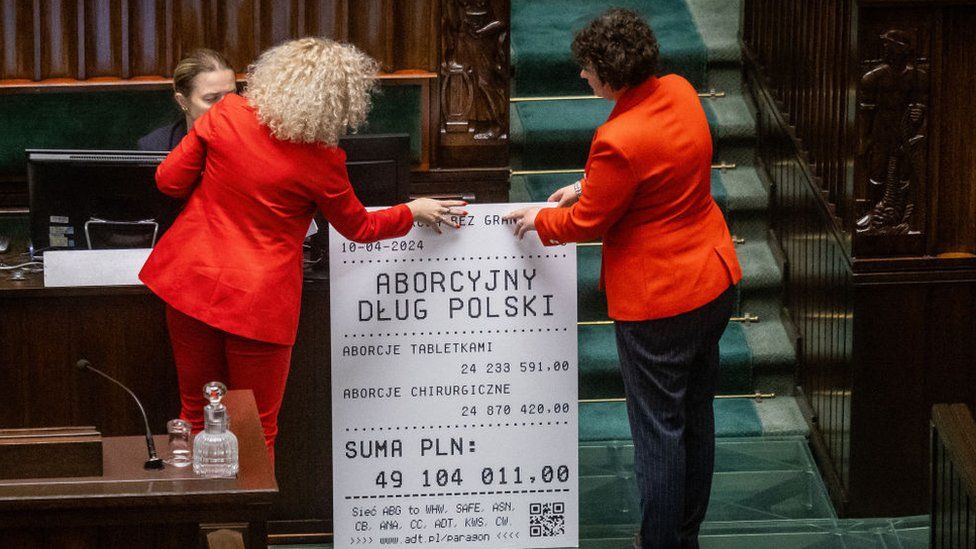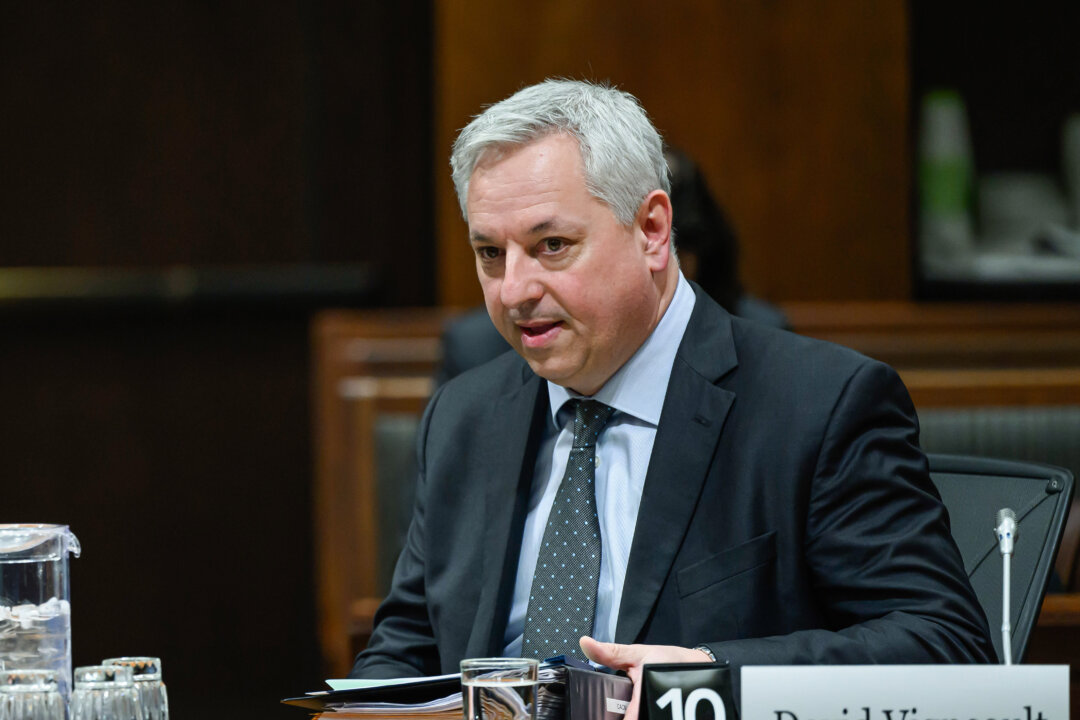 Image source, WOJTEK RADWANSKI/AFP
Image source, WOJTEK RADWANSKI/AFP
Equality Minister Katarzyna Kotula (L) and a coalition colleague hold a mock-up of an invoice for the money owed by the state for abortions
By Adam Easton
BBC News, Warsaw
Polish MPs have held a landmark debate on whether the state should give women the right to abortion on demand for the first time in more than 30 years.
The Catholic faith remains strong in Poland and many expected the debate to provoke strong, perhaps stormy emotions.
But many MPs didn't take the time to turn up and listen.
Few MPs for the right-wing opposition attended, while there were also any absences from government members.
Women comprise just 29% of parliamentarians in Poland's lower house, the Sejm, but the speakers during the debate were mostly women.
MPs debated liberalising one of the EU's most restrictive abortion laws. The procedure is only permissible when the pregnancy endangers a woman's health or when it results from rape or incest.
Many opinion polls have shown growing support for increased access to abortion, especially on medical and criminal grounds, but politicians have been reluctant to act.
Image source, WOJTEK RADWANSKI/AFP
Image caption,Abortion rights activists gathered at the Polish parliament as the debate took place
In fact, the previous right-wing Law and Justice-led government, backed by the Catholic Church, presided over a tightening of the law when Constitutional Tribunal judges linked to the government ruled in 2020 that abortion on the grounds of severe and irreversible foetal abnormalities was unconstitutional.
The ruling caused widespread anger. For months, hundreds of thousands of women protested in towns and cities across the nation.
"It's barbaric. Torture has been legalised by the Constitutional Tribunal. It's high time to fix the mistake that was made then," Antonina Lewandowska of the Federa rights group told the BBC.
"Our country forces women to carry unwanted pregnancies to term in cases with foetal malformations. It's despicable."
Since the ruling, several women have died in hospital as doctors have refused to perform abortions even in cases where severe foetal abnormalities endanger the mother's life.
"The abortion ban kills and does not make abortion disappear. People who want one simply find another way," Equality Minister Katarzyna Kotula said.
Image source, SERGEI GAPON/AFP
Image caption,Poland has some of the tightest abortion laws in the EU and anti-abortion activists gathered in Warsaw as the debate took place
Outside parliament, anti-abortion protesters displayed a banner comparing the left-wing minister to Adolf Hitler. About 20 demonstrators struck a church bell as the taped cries of a newborn were played on a loop.
Inside the chamber, Dariusz Matecki from the Sovereign Poland party brandished a placard with a foetus on it along with a recording of a foetus's beating heart.
Many coalition MPs argued abortion was a woman's right, but Law and Justice deputy Katarzyna Sojka disagreed. "Don't speak on behalf of all Polish women because they don't have the same opinion as you," she said.
Civic Coalition MP Monika Rosa retorted that the debate concerned "fundamental values".
PhD student Karolina Dobrowolska opposes abortion on demand. A former member of the conservative Catholic Ordo Iuris centre, she argues abortion does not constitute a human right and supports a return to the pre-ruling status.
"Despite the fact I am pro-life - but a feminist - I see that the judgment was too radical and adopted completely without discussion with women," she told the BBC. "It stigmatises women who have real health issues and in fact have no choice."
Poland's new prime minister, Donald Tusk, has pledged to introduce abortion on demand. But his coalition, which ranges from the left to agrarian conservatives, is split over how far to liberalise the law.
Image source, WOJTEK RADWANSKI/AFP
Image caption,Prime Minister Donald Tusk (C) is part of a three-party coalition which is divided over the issue of abortion
The Left and Mr Tusk's centrist Civic Coalition submitted bills to offer abortion on demand up to 12 weeks, and up to 24 weeks in certain medical and criminal cases. The Left also want to decriminalise abortion assistance. Anyone who assists in a pregnancy termination currently faces up to three years in prison.
The conservative Third Way favours a referendum on the issue.
A vote on whether to throw out the bills or send them for further work in commission is expected on Friday.
Liberalising the law will not be easy. Law and Justice said it would oppose abortion on demand but would discuss the Third Way's proposal.
The coalition has a slim majority and abstentions from the Third Way could send the Left and Civic Coalition's proposals straight to the bin.
Even if all four bills survive until a final vote, Polish President Andrzej Duda, a practising Catholic, has the power to veto bills passed by parliament. He is expected to exercise his right.












 English (US) ·
English (US) ·  Turkish (TR) ·
Turkish (TR) ·